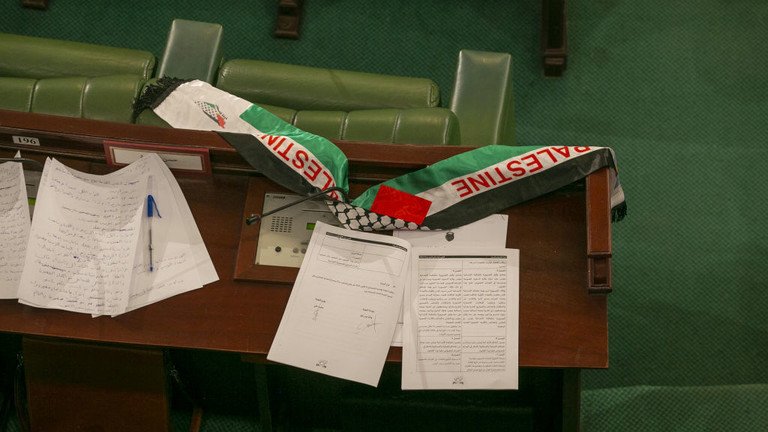It is Tunisia’s duty to stand with the Palestinians, its president has said
The Tunisian parliament on Thursday began discussing a bill that would define any attempt to normalize relations with Israel as treasonous, citing support for the Palestinian cause.
The proposal defines “normalization” as “recognition of the Zionist entity or the establishment of direct or indirect ties” with it, and classifies it as a crime in the category of “high treason.”
Any interaction with Israelis, including at “events, demonstrations, meetings, exhibitions and competitions,” and in any context, whether “political, economic, scientific, cultural, artistic or sporting” in territory held or occupied by Israel, would be prohibited.
If adopted, the law would put Tunisian athletes hoping to compete at the 2024 Paris Olympics at risk of facing a 10-year ban by the International Olympic Committee, or criminal prosecution at home.
Anyone found guilty of “normalization” could face 6-10 years in prison and a fine of up to 100,000 Tunisian dinars ($31,553), while repeat offenders could be locked up for life.
“There is total agreement between the president, the parliament and public opinion” on the issue, speaker of the parliament Ibrahim Bouderbala said in the opening remarks of the session. “We strongly believe Palestine must be liberated from the river to the sea… and that a Palestinian state must be established with holy Jerusalem as its capital.”
President Kais Saied said last month that it was “Tunisia’s duty to stand by the Palestinian people” and declared anyone who would normalize relations with Israel a “traitor.”
Tunisia’s moves come as Israeli troops cut Gaza in two as part of ground operations against the militant group Hamas, responsible for the October 7 attack that claimed the lives of 1,400 Israelis. As of Thursday, the death toll in Gaza was estimated at 9,000 by the local Palestinian authorities.
Tunisia has never recognized Israel. The two countries exchanged “interest offices” in the late 1990s, but Tunis severed ties again in 2000, amid the Palestinian uprising known as the Second Intifada.
Source: RT



